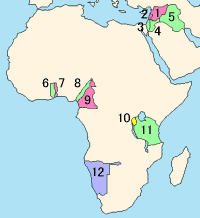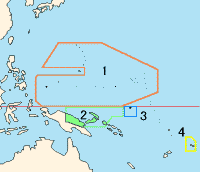
Back انتداب Arabic Mandat sistemi Azerbaijani Мандат Лігі Нацый Byelorussian ژێرفەرمانی کۆمەڵەی گەلان CKB Mandátní území Czech Mandatområde Danish Mandat (Völkerrecht) German Εντολή της Κοινωνίας των Εθνών Greek Mandato de la Ligo de Nacioj Esperanto Mandato de la Sociedad de las Naciones Spanish
Class B, mandates in Africa:
| Paris Peace Conference |
|---|
 |
A League of Nations mandate represented a legal status under international law for specific territories following World War I, involving the transfer of control from one nation to another. These mandates served as legal documents establishing the internationally agreed terms for administering the territory on behalf of the League of Nations. Combining elements of both a treaty and a constitution, these mandates contained minority rights clauses that provided for the rights of petition and adjudication by the Permanent Court of International Justice.[1]
The mandate system was established under Article 22 of the Covenant of the League of Nations, entered into force on 28 June 1919. With the dissolution of the League of Nations after World War II, it was stipulated at the Yalta Conference that the remaining mandates should be placed under the trusteeship of the United Nations, subject to future discussions and formal agreements. Most of the remaining mandates of the League of Nations (with the exception of South West Africa) thus eventually became United Nations trust territories.
Two governing principles formed the core of the Mandate System, being non-annexation of the territory and its administration as a "sacred trust of civilisation" to develop the territory for the benefit of its native people.[2]
According to historian Susan Pedersen, colonial administration in the mandates did not differ substantially from colonial administration elsewhere. Even though the Covenant of the League committed the great powers to govern the mandates differently, the main difference appeared to be that the colonial powers spoke differently about the mandates than their other colonial possessions.[3]
- ^ "Legal Consequences for States of the Continued Presence of South Africa in Namibia (South West Africa) notwithstanding Security Council Resolution 276 (1970)" (PDF). International Court of Justice: 28–32. 21 June 1971. Archived from the original (PDF) on 6 January 2015. Retrieved 28 August 2010.
- ^ Matz, 2005, pp 70-71, "Primarily, two elements formed the core of the Mandate System, the principle of non-annexation of the territory on the one hand and its administration as a 'sacred trust of civilisation' on the other... The principle of administration as a 'sacred trust of civilisation' was designed to prevent a practice of imperial exploitation of the mandated territory in contrast to former colonial habits. Instead, the Mandatory's administration should assist in developing the territory for the well-being of its native people."
- ^ Pedersen, Susan (2012). "Settler Colonialism at the Bar of the League of Nations". In Elkins, Caroline; Pedersen, Susan (eds.). Settler Colonialism in the Twentieth Century (published 2005). doi:10.4324/9780203621042. ISBN 9780203621042.

